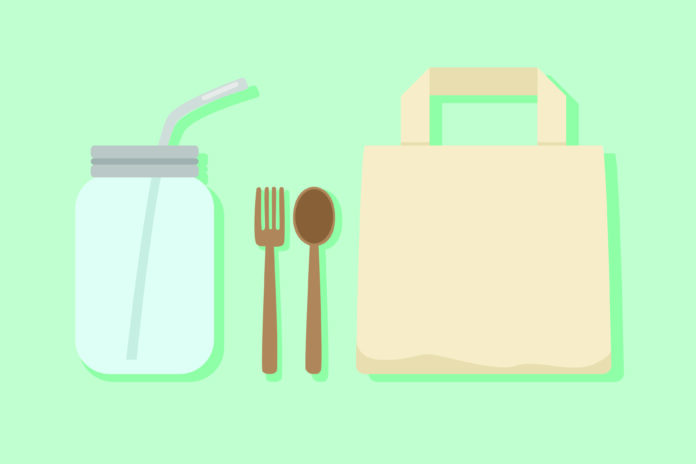Aggies attempt to reduce waste to benefit the planet
Climate change, garbage patches and general pollution affect our earth, society and economy daily. These issues are increasingly relevant to many, sparking a conversation among younger generations about how to initiate progress and change. In the last several years, the UC system established a comprehensive goal to achieve zero waste — or 90% diversion from landfills — by 2020. Zero Waste is defined as “a philosophy that encourages the redesign of resource life cycles so that all products are reused. The goal is for no trash to be sent to landfills, incinerators, or the ocean.” While the university takes steps toward mitigating emission, many students have taken it upon themselves to reduce their carbon footprint by attempting low or zero waste. However, with many of the other stressors associated with student life, maintaining a low or zero waste lifestyle can be a difficult feat.
Second-year wildlife, fish and conservation biology major Breeze Davis practiced low waste for six months and zero waste for two months. She said being low and zero waste helped her find a sense of purpose and fulfillment.
“Being zero waste means a different thing to everyone,” Davis said. “To me it meant being intentional and not inviting trash into my life. It was nice always having a goal I was working towards and trying to get better at.”
Since the beginning of 2019, however, Davis found it challenging to strike a balance between maintaining her low waste lifestyle, performing well in school and looking after her overall well-being. Although Davis continues to try to lower her carbon footprint, she no longer considers herself low or zero waste.
“It’s really hard to take on a feat like this if you are personally not in a good place or if you’re dealing with a lot of stuff,” Davis said. “For me, it was a strain on my mental health.”
Davis also struggled with the financial aspect the zero waste lifestyle. She said the high cost of sustainable products — specifically bulk items — created a barrier between her desire and ability to accomplish zero waste.
“Expense plays into the stress a lot,” Davis said. “Shopping zero waste can often be more expensive compared to buying in plastic because zero waste products are often times organic or local.”
Fourth-year nutrition science major and low-waste student Tiffany Gonzalez had a different approach to the costs of zero waste living.
“My zero waste journey actually started as a way to save money,” Gonzalez said. “My first year of college, money was very tight and I was looking at what I spent the most on—things like toiletries, makeup and plenty of fast food—and started looking up ways to make them myself or replace them with longer lasting versions.”
For Gonzalez, this practice developed into an ideological passion which inspired her to live a more sustainable lifestyle. Further, Gonzalez utilizes media platforms including Facebook and her blog, theecohoe.com, to help spread her message and inspire others to try reducingtheir waste.
“My goal at the moment is to raise enough awareness for these issues until action is taken by our policy makers,” Gonzalez said. “Whether it’s through posting on my blog or even just picking up trash in the Arboretum on my days off, I want to see the conversation happening and hopefully get people to realize that this is something that is going to affect all of us at some point or another.”
Regardless of her passion and willingness to spread her message, Gonzalez also encounters obstacles when trying to juggle the demands of her low waste lifestyle and the demands of being a full-time student.
“Trying to make every single item you use, whether it’s makeup or even just meal prepping takes a lot of time that most of us just don’t have between midterms and exams every single week,” Gonzalez said.
Regardless, Gonzalez finds solace in the fact that being low or zero waste does not have to mean being perfect. She stresses that having the intention to lower waste is impactful and a good place to start.
“Zero waste isn’t about not generating waste as much as it is being a conscious consumer,” Gonzalez said. “I’m not perfect and I don’t always have time to make everything I need, so when I buy something in plastic I make sure I use it completely and even repurpose the container if I can.”
While there are many obstacles associated with being zero waste, both Davis and Gonzalez emphasize that it is a very enriching way to be intentional and compassionate. Both students found purpose in dedicating themselves to a demanding and time-consuming lifestyle for the benefit of the greater good.
“I would love to try and be zero waste again at some point,” Davis said. “When you’re zero waste you’re doing something for the planet that everyone lives on. It’s not just for you.”
Gonzalez said being accepting of others and allowing space for growth is essential to working together to help save our planet. “Above all, I think this movement really stems from compassion,” Gonzalez said, “We all live on this earth and regardless of our differences, it’s truly the one thing none of us can live without.”
Written by: Miki Wayne — features@theaggie.org




